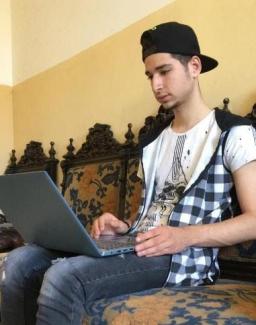Mohamad Ghalayene, a 19-year old living in northern Lebanon has always been eager to learn more, but was never afforded the option. He says, “Now through this grant, I finally got the opportunity to attend online training sessions and tackle [educational] topics to make use of my time during home quarantine.”
Mohamad is a 19-year old Lebanese participant in the vocational training program organized by USAID’s five-year activity, BALADI CAP. This program provides capacity building assistance to civil society organizations in Lebanon. USAID continuously seeks to increase partnerships with local organizations to enhance long-term effectiveness after a program ends. By working with local organizations, USAID empowers vibrant societies and the civil society organizations that serve communities. The BALADI CAP activity’s newest grantees, the Tripoli Association for Relief and the Education of Orphans-Dar Al-Zahraa (DAZ) are two faith-based organizations that serve Lebanese and refugee youth in northern Lebanon.
Mohamad is one of many youths forced to drop out of school at a young age due to hard living conditions in the poverty-stricken areas of northern Lebanon. His eagerness to learn was the impetus for him to enroll in USAID’s informal education and vocational training program. Mohamad joins the program with 79 other Lebanese and refugee youth and young adults. Of these participants, 60 are women. These youth and young adults are excited to engage in a range of classes covering sewing, child care assistance, and fine arts, as well as Basic Literacy and Numeracy (BLN) and life skills courses.
In light of the COVID-19 pandemic and the inability to resume the program’s classes in person, DAZ produced online materials and educational videos for the program participants. Gaining new skills through these courses is a great opportunity for Mohamad and his fellow students. By learning English, Arabic, BLN, and life skills, youth will improve their employment prospects with the hope of generating a decent income to help support their disadvantaged families.
Through this $50,000 USAID grant, DAZ will also train their tutors to acquire the necessary skills to provide psychosocial support services to 400 beneficiaries, including orphans, at-risk youth, and elderly individuals in the region. USAID will also support DAZ to furnish and equip play areas and youth spaces, creating a positive environment for learning, recreation, and psychosocial wellbeing in the community.

